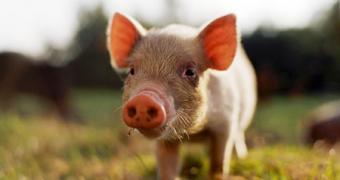A pilot project for managing hog waste started three years ago by Duke University and Duke Energy has just received an endorsement from Google. The technology corporation has stepped up its investments in carbon offset technology lately, to help bring its net carbon footprint down to zero.
The university and the power company, which already had financial assistance from state and federal agencies, are working on a project that can control greenhouse gas emissions, reduce pollutants and generate renewable energy.
Specifically, the specialists in charge with the project are turning methane obtained from pig manure into electricity.
The system, built at Loyd Ray Farms, northwest of Yadkinville, N.C., captures greenhouse gas from hog waste and burns it to run a turbine, thus reportedly producing enough electricity to power 35 homes for a whole year.
The prototype system is worth $1.2 million and is intended to serve as model for other hog farms seeking to obtain renewable power.
Capturing the methane creates carbon offset credits for Duke University and Google and using it generates renewable energy credits for Duke Energy. Loyd Ray Farms will use surplus electricity on-site.
Duke Energy and the university will share operational and maintenance costs for the first 10 years of operation. Google, who disclosed that it consumed 2.2 million megawatts of electricity last year, will assume a share of the university's portion of the costs in return for a portion of the carbon offsets for a 5-year term.
"Through this pilot, Duke is showing how these projects can make economic sense for North Carolinians and lead to dramatic reductions in emissions over the long term," stated Jolanka Nickerson, the program manager for Google's Carbon Offsets Team, in a recent blog post. "We hope technologies like this can scale across the U.S. and world."
Nickerson also promised, on behalf of Google, that they will continue to look for new and better ways to reduce the amount of electricity it uses and greenhouse gas it produces.
The video below provides an insight on how Google evaluates carbon offset projects:

 14 DAY TRIAL //
14 DAY TRIAL //